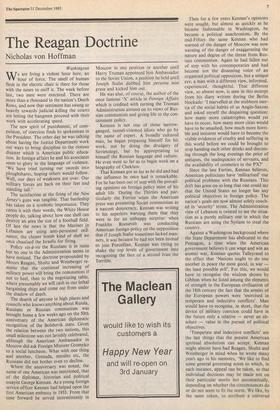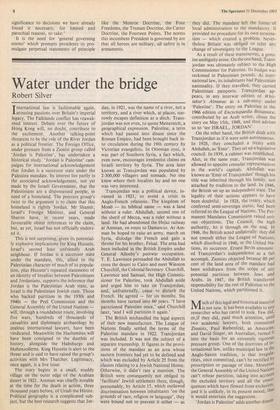The Reagan Doctrine
Nicholas von Hoffman
Washington
We are living a violent hour here, an hour of force. The smell of human flesh in the electric chair is there for those with the noses to sniff it. The week before last, two men were executed. There are more than a thousand in the nation's Death Rows, and now that sentiment has swung so heavily towards judicial .killing the courts are letting the hangmen proceed with their work with accelerating speed.
The new spirit of punishment, of com- pulsion, of coercion finds its spokesman in the President. The other day he was talking about having the Justice Department work out ways to bring discipline to the riotous disaster which is American public educa- tion. In foreign affairs he and his associates seem to glory in the language of violence.
'We have tried turning our swords into
ploughshares, hoping others would follow. Well, our days of weakness are over. Our military forces are back on their feet and standing tall.'
The satisfaction at the firing of the New Jersey's guns was tangible. That battleship has taken on a symbolic importance. They caress it with their words, the White House people do, talking about how one shell can destroy an area the size of a football field. Of late the news is that the Marines in Lebanon are using anti-personnel ord- nance, the cluster bomb kind of shell we once chastised the Israelis for firing.
Policy vis-à-vis the Russians is in ruins
but no one in the Administration seems to have noticed. The doctrine propounded by Messrs Reagan, Shultz and Weinberger re- mains that the continual increasing of military power will bring the communists if not to heel, then to the negotiating table, where presumably we will cash in our lethal bargaining chips and come out from under the shadow of death.
The dearth of anyone in high places and councils who knows anything about Russia, Russians or Russian communism was brought home a few weeks ago on the 50th anniversary of the American diplomatic recognition of the Bolshevik state. Given the relation between the two nations, this small milestone was not lavishly celebrated, although the American Ambassador in Moscow did ask Foreign Minister Gromyko to a social luncheon. What with one thing and another, Grenada, missiles etc, the Russians did not bother even to decline.
Where the anniversary was noted, the name of one American was mentioned, that of the diplomat, historian and political essayist George Kennan. As a young foreign service officer Kennan had helped open the first American embassy in 1933. From that time forward he served intermittently in Moscow in one position or another until Harry Truman appointed him Ambassador
to the Soviet Union, a position he held until Joseph Stalin dubbed him persona non grata and kicked him out.
He was also, of course, the author of the once famous 'X' article in Foreign Affairs
which is credited with turning the Truman Administration around on its views of Rus- sian communism and giving life to the con- tainment policy.
Kennan is not one of those narrow- gauged, tunnel-visioned idiots who go by the name of expert. A broadly cultured man, he began preparing himself for his work, not by doing the drudgery of Sovietology, but by appropriating to himself the Russian language and culture. He even went so far as to begin work on a biography of Chekhov.
That Kennan got as far as he did and had the influence he once had is remarkable.
For he has been out of step with the prevail- ing opinions on foreign policy most of his adult life. During the Thirties and par- ticularly the Forties when the American press was presenting Soviet communism as a nascent democracy, Kennan was writing
to his superiors warning them that they were in for an unhappy surprise: when Franklin Roosevelt was conducting American foreign policy on the supposition that if Joseph Stalin sometimes lacked man- ners, it was because he had not been invited to join Porcellian, Kennan was trying to shake the top levels of government into recognising the face of a second Ivan the Terrible. Then for a few years Kennan's opinions were sought, but almost as quickly as he became fashionable in Washington, he became a political anachronism. By the mid-Fifties the same Kennan who had warned of the danger of Moscow was now warning of the danger of exaggerating the nature and degree of the threat from Rus- sian communism. Again he had fallen out of step with his contemporaries and had become not the dissenting voice of an organised political opposition, but a unique eye, a man with a different view, informed, experienced, thoughtful. That different view, so absent now, is seen in this excerpt from his diary written during the Berlin blockade: '1 marvelled at the stubborn iner- tia of the social habits of us Anglo-Saxons and asked myself the despairing question: how many more catastrophes would yet have to occur, how many more cities would have to be smashed, how much more horri- ble and insistent would have to become the visible evidences of cruelty and suffering in this world before we could be brought to stop handing each other drinks and discuss- ing through the long evenings the price of antiques, the inadequacies of servants, and the availability of cosmetics in the PX?'
Since the late Forties, Kennan believes, American politicians have 'militarised' our political problems with the Russians. This drift has gone on so long that one could say that the United States no longer has any political objectives in foreign policy. The nation's goals are now almost solely couch- ed in 'security' terms. The Administration view of Lebanon is twisted to see the situa- tion as a purely military one in which the Russians are using the Syrians to steal the country.
Against a Washington background where the State Department has abdicated to the Pentagon, a time when the American government believes it can wage and win an atomic war, Kennan quotes Talleyrand to the effect that 'Nations ought to do one another in peace the most good, in war the least possible evil'. For this, we would have to recognise the wisdom shown by Gibbon when he listed among the elements of strength in the European civilisation of the 18th century the fact that the armies of the European powers were 'exercised in temperate and indecisive conflicts'. Man would have to recognise, in short, that the device of military coercion could have in the future only a relative — never an ab- solute — value in the pursuit of political objectives.
'Temperate and indecisive conflicts' are the last things that the present American spiritual absolutism can accept. Kennan might almost have had Reagan, Shultz and Weinberger in mind when he wrote many years ago in his memoirs, 'We like to find some general governing norm to which, in each instance, appeal can be taken, so that individual decisions may be made not on their particular merits but automatically, depending on whether the circumstances do or do not seem to fit the norm. We like, by the same token, to attribute a universal significance to decisions we have already found it necessary, for limited and parochial reasons, to take.'
It is the need for 'general governing norms' which prompts presidents to pro- mulgate perpetual statements of principle like the Monroe Doctrine, the Four Freedoms, the Truman Doctrine, the Carter Doctrine, the Fourteen Points. The norms this incumbent President is governed by are that all heroes are military, all safety is in armaments.















































 Previous page
Previous page